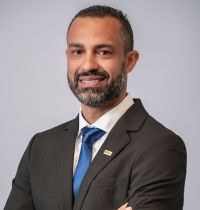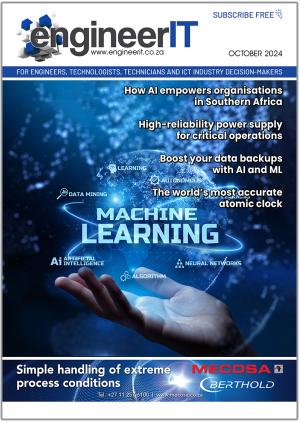By Marcel Bruyns, Sales Manager for Africa at Axis Communications

Enterprises across all sectors are prioritising this technology, embracing its transformative potential to drive change and growth.
In South Africa, we are embarking on an exciting AI journey filled with boundless possibilities. AI-centred developments are visible across various sectors. Take healthcare, for instance.[1] AI is increasingly being deployed to improve diagnostic accuracy and patient care. South African start-ups are making waves in this area, employing AI to provide quicker, more accurate diagnoses of medical imaging. In the agricultural sector, AI is utilised to forecast crop yields and optimise farming practices, boosting productivity and sustainability, and supporting food supply chains in Africa.[2]
We have already taken significant strides, as evidenced by establishing the South African Artificial Intelligence Association (SAAIA)[3]. The association's vision is to boost AI adoption for commercial endeavours, while unlocking societal benefits. We're not just promising progress; we're delivering it, paving the way for AI to revolutionise our businesses and the broader South African society.
AI: An ally, not a replacement
Let's clear up a widespread misconception about automation. In South Africa, where an unemployment rate of 32.9% in the first quarter of 2023[4] – among the highest in the world – is an alarming statistic, we must stress that AI isn't about substituting humans with machines. It's about optimising internal business operations and freeing up workers to be more creative by automating tasks, making better decisions, creating new products, enhancing external processes, pursuing new markets, and capturing and applying data where needed.[5] AI is empowering human operators, facilitating quicker, better-informed real-time decisions. AI is not just a tool – it's a powerful ally for businesses.
Critical infrastructure sectors are no exception. AI's transformative power is particularly evident in sectors such as energy and utilities. In a South African context, where loadshedding has cost the country more than R1.2 trillion,[6] AI could prove to be a real, fundamental enabler for energy projects offering multiple applications. These include production optimisation with computer vision to analyse asset utilisation, reducing downtime for predictive maintenance of equipment, capacity understanding, and modelling for predicting corrosion risks to reduce maintenance costs on power plants.
Similarly, in transport and logistics, AI-powered predictive analytics could be used to reduce traffic congestion and accidents, lessen carbon emissions, and minimise overall financial expenses.[7]
AI in action: Enhancing surveillance and security
We recently witnessed an example of AI's vast potential within our business environment, embodied by a development in object analytics. A new feature was introduced that leverages AI to analyse movement patterns within a specific area over a given time, aiding in detecting anomalies.[8]
This advancement in AI capabilities isn't just enhancing reactive measures; it's transforming proactive threat identification and mitigation. Picture a world where our assets are protected more effectively, our premises are secured more robustly, and our businesses operate more efficiently. This isn't a theoretical vision; it's rapidly becoming a reality, redefining how we approach security and surveillance in our crucial infrastructure sectors.
The recent AI-powered innovation is a testament to the transformative potential of AI within our critical infrastructure. It's an upgrade, a game-changer that stands to reshape our understanding of safety and security in the digital age.
The future is AI: Seizing the opportunity
AI isn’t just a trend; it's an unprecedented opportunity for innovation and growth. As AI continues to mature, it has the potential to redefine our processes, boost our productivity, and strengthen the security of our critical infrastructure sectors. This goes beyond merely automating tasks. It's about enhancing our capabilities, reshaping our operations, and transforming our approach to problem-solving.
This transformative power of AI extends to every aspect of our society, from healthcare and agriculture to energy distribution and security. As such, it's crucial for South African enterprises and public institutions to seize this opportunity. Investment in AI and other advanced technologies is no longer optional; it's a strategic imperative for any organisation looking to stay relevant in the modern world and drive South Africa's future success. The onus is on us to turn the promise of AI into tangible results for our economy and society.
[1]https://scienceforafrica.foundation/node/186#:~:text=AI%20systems%20ingest%20large%20amounts,on%20real%20time%20data%2C%20etc.
[2] https://www.cips.org/supply-management/news/2023/june/how-ai-is-protecting-food-supply-chains-in-africa/
[3] https://saaiassociation.co.za/
[4] https://www.statssa.gov.za/?p=16312
[5] https://hbr.org/2018/01/artificial-intelligence-for-the-real-world
[6] https://www.iol.co.za/pretoria-news/news/load-shedding-has-cost-sa-economy-more-than-r12-trillion-court-hears-7abb9434-5459-4f62-ad95-74b0e55c71e7#:~:text=2%20trillion%2C%20court%20hears,-A%20candle%20is&text=Pretoria%20%2D%20Load%20shedding%20has%20cost,loss%20endured%20by%20the%20country.
[7] https://www.forbes.com/sites/cognitiveworld/2019/07/26/how-ai-can-transform-the-transportation-industry/?sh=42c9a80e4964
[8] AXIS Object Analytics now offers occupancy in area and final time in area feature | Axis Communications















